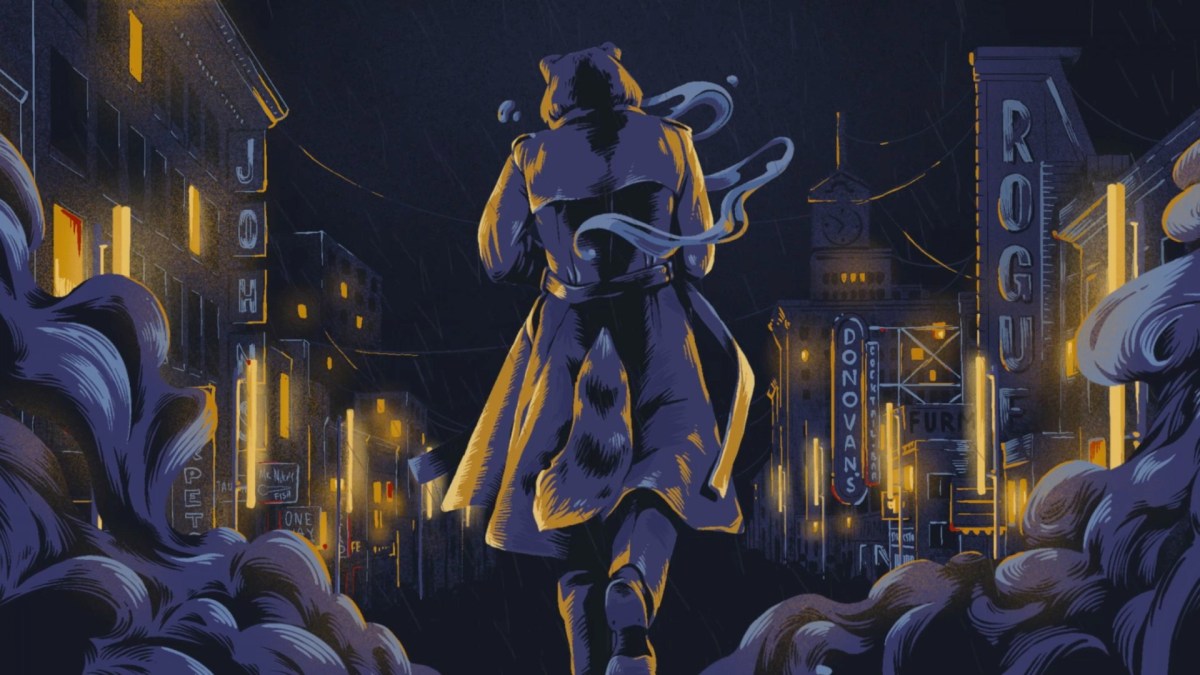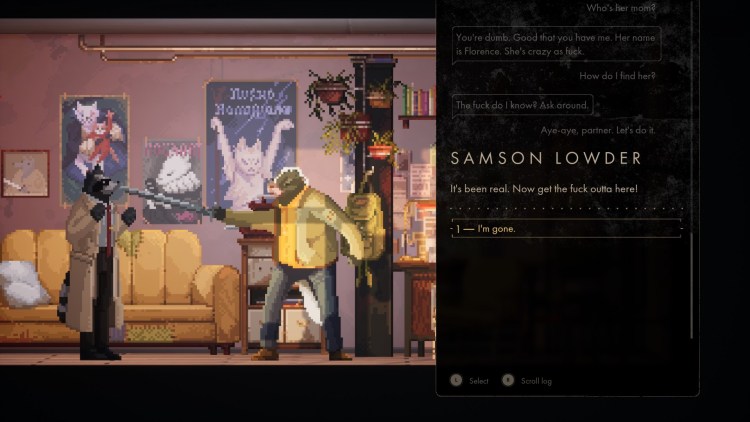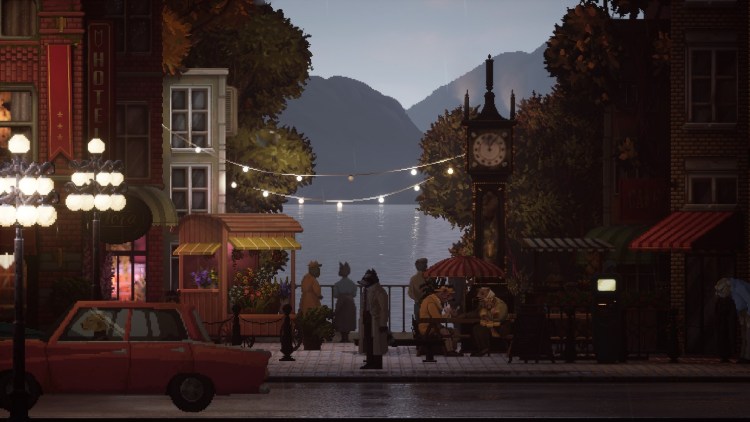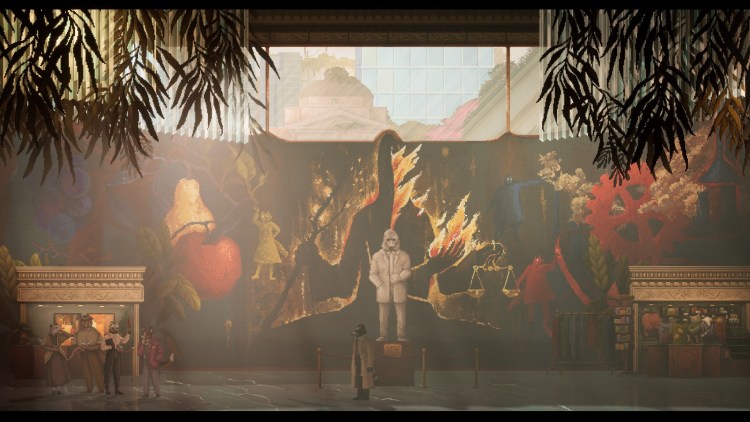Successfully pulling off a noir story is hard. Doing so requires nailing the tone and dialogue to a degree that many people aren’t quite up to. Backbone easily does this well. The game’s pixel artwork is gorgeous, bristling with colorful, moody explorations of decadent urban sprawl preyed upon by the haves. The game starts out with a bang, which hyped me up for the subsequent chapters. But it peters out after a while and ends up rushing to an unsatisfying conclusion. It’s still a thought-provoking, unique piece of entertainment, but the game feels like it should have been more.
Backbone begins with our protagonist, a raccoon private investigator named Howard Lotor, reading a book in his bathtub. He’s got a case on his hands. A pregnant wife, endlessly aggravated by her husband’s behavior, has turned to Howard to procure pictures to air out said husband’s dirty laundry. It’s a classic noir setup, to be sure. Howard gets the details he needs, takes the case, and then sets out into the city to get what he’s after. Within a few minutes of questioning the locals, he learns that the husband likes to spend his time in a questionable establishment known as The Bite.
Howard makes his way into the place, only to find himself unraveling a thread of depravity and corruption that leads directly to the people who hold the power in the future, animal-occupied Vancouver. The first two chapters or so of Backbone are engrossing, and I found myself drawn to the game’s mystery and rising action. The dialogue is pitch-perfect. There’s no voice acting, but the words jump off the screen all the same, doing much to bring these animal people to life, with their unique manners of speaking and a fair amount of swearing.
All hail the new flesh
Unfortunately, Backbone‘s plot can’t keep it going for the duration. The central mystery pushing the narrative forward dissolves, and the story pivots into something reminiscent of a classic Cronenberg movie. The last couple of acts rush towards a conclusion and, while the quality is still good, it doesn’t match the level set by the first two chapters. The ending simply left me unsatisfied. It doesn’t help that the game is only about three and a half hours long. That just doesn’t give it the time it needs to develop and truly breathe life into this intriguing world the developers have built.
Which is a shame, because I wanted to know more. I wanted to dive deep into these characters and learn about the history of the city and the apes ruling it. Instead, the narrative is content to resemble the last couple of episodes of Neon Genesis Evangelion, a series well known for having major production problems at the very end. It just felt like a cop-out, as if the first half of the game that I was so impressed by was more of a façade than anything else. Perhaps this is exactly what the developer was going for, but it seems like a missed opportunity to me.
Regardless, it’s still worth experiencing, I think. Expectations simply need to be held in check, as some of the disappointment is still lingering with me even now. The high caliber of the dialogue and how memorable many of the characters are truly do make Backbone stand out. Plus, the visuals make the game a necessary play for anyone who loves detailed pixel art. I can’t think of many games that so perfectly reach an apex of visual craftsmanship and atmosphere. What Backbone accomplished on that front is mesmerizing.
Choose your words, as if they matter
Backbone seems like a choice-based adventure game at first. In order to progress, people need to be spoken to and objects need to be interacted with to move things forward. When talking to other characters, you can select Howard’s responses. The richness of the dialogue makes these conversations feel impactful, and I actually thought about my replies much of the time. Certain responses seem like they can shape the destiny that lies before Howard. After beating the game, I thought that it might have multiple routes. There are certain things that could certainly go very differently, had Howard simply made slightly different choices.
Therefore, I started a new game and dove in. I tried to do things differently and picked different dialogue options. I even intentionally ignored meeting a major character. However, when Howard is meant to meet them next, the two of them spoke as if they’ve been introduced before. Conversations merely give you the illusion of choice. Nothing I said mattered, and I ended up in the same courses of action no matter what. Perhaps I missed something, sure. But as best as I can tell, Backbone grants players no agency; you’re just along for the ride.
Occasionally, there are simple puzzles to solves, but you’re mostly just going to be reading. This becomes more clear as the game goes on, too. During the first couple of acts, it truly seems that Backbone is much more open than it is. But the sense of myopia increases until you’re basically on rails. Still, playing the game again and selecting different dialogue options does lead to new responses, even if you still end up on the same track you were on before.
And therein lies the rub. I would be more than willing to excuse all of this if the story didn’t rush and randomly pivot to certain elements that seemed out of place. Backbone is undeniably well crafted and will easily hold people’s interest. Your mileage may vary depending on how compelling you find the first couple of chapters, I suppose. But so many mysteries are left hanging, that I can’t help but walk away underwhelmed.
Regardless, I am glad to have played the game, as some of the concepts and visuals will stay with me. I wish there was more to it, and some choice would have gone a long way. I’d still like to see more of this world one day, so perhaps there will be more to come.











Published: Jun 7, 2021 08:05 pm